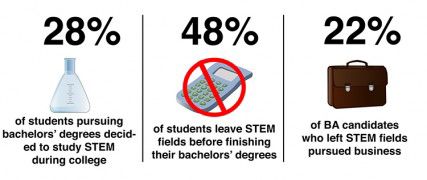
Students in science, technology, math and engineering college programs may be less likely to stay within the fields, according to a new study, and Boston University students say this trend is visible within BU’s STEM degree programs.
College of Arts and Sciences senior Mackenzie Harrington, a chemistry major with a concentration in biochemistry, said her freshman class began with approximately 90 students and 20 to 30 people dropped the major after the first semester.
“Most of my friends I made freshman year switched to different majors,” she said. “A couple stayed within sciences, they switched to biology or earth science, but most of them switched to different colleges within BU.”
About of 28 percent of students pursuing a bachelor’s degree and 20 percent of students pursuing an associate’s degree decided to enter a STEM field at some point during their college careers, according to a study released Tuesday by the U.S. Department of Education’s National Center for Educational Statistics.
However, of the students who entered STEM fields between 2003 and 2009, about 48 percent of bachelor’s degree candidates and 69 percent of associate’s degree candidates had left STEM degree programs by 2009, the report stated.
The study examined data from students who began postsecondary education in STEM fields in the 2003-04 school year, tracking attrition rates of these students for the following four to six years.
In opposition to the researchers’ initial expectations, however, other majors had similar rates of attrition. At the bachelor’s degree level, attrition rates were 8 to 12 percent higher in fields such as humanities, education and health sciences than in STEM fields. However, attrition rates in social and behavioral sciences were comparable to STEM attrition rates.
Harrington said students’ decision to switch out of the field was due to a combination of factors, including personal interest in chemistry and the difficulty of introductory courses.
“From the people I’ve talked to, some just realized they weren’t interested in it [chemistry], some thought they weren’t going to be successful in it and some thought it was too hard to get through college with,” she said. “It was mainly interest, though.”
CAS sophomore Dylan Lewellyn, who intends to switch majors from marine biology to business with a minor in sustainable energy, said his decision to transfer to into BU’s School of Management was based largely on personal interest.
“I didn’t see myself becoming a scientist,” he said.
Lewellyn said he has noticed a trend with science majors transferring into SMG to pursue business degrees.
Computer engineering major Jesse Belanger, a College of Engineering sophomore, said students also tend to transfer out of engineering fields, particularly as underclassmen.
Belanger also cited difficulty and interest as main reasons why students chose to switch out of ENG.
“A lot of people end up in engineering because their dads are engineers, and they say, ‘Oh, you should go be an engineer, they make a lot of money,’” Belanger said. “They do it, and then some people can deal with how boring it is, but other people say, ‘No, I can’t bore myself this much and lose this much of my life for something I don’t really care about’ … It [engineering] is a huge, huge commitment.”
CAS and School of Education senior Crystal Shah, a dual degree major in neuroscience and science education, said students often switch out of science degree programs at BU because they had different expectations about college-level science courses.
“A lot of people come in thinking that science in high school was a lot of fun and it wasn’t that bad, but college science is very different,” she said. “People realize that that’s not what they want to do for their entire lives, and they take up something that they’re probably more passionate about.”
For STEM students debating transferring from the field, Shah said she advises they spend some time working through introductory courses before making the transition.
“If it’s something that you really love and there’s that difficulty factor, especially in college — if you can push through that difficulty factor, if you can push through those general science courses and get to those courses where you get to actually choose what you’re interested in — I would really recommend people to do that,” she said. “But you have to have a good reason to continue with STEM.”
This is an account occasionally used by the Daily Free Press editors to post archived posts from previous iterations of the site or otherwise for special circumstance publications. See authorship info on the byline at the top of the page.



